Japan’s Ministry of Health, Labour and Welfare (MHLW) has granted approval for Daiichi Sankyo and AstraZeneca’s Enhertu (trastuzumab deruxtecan) to treat unresectable advanced or recurrent non-small cell lung cancer (NSCLC) with HER2 (ERBB2) mutations in adults.
The treatment is indicated for use in patients who have advanced following treatment with chemotherapy.
The latest development is based on data from the international Phase II DESTINY-Lung02 clinical trial that is assessing the safety and efficacy of two doses of Enhertu.
Pre-specified interim assessment data from the trial showed that Enhertu offered a 53.8% objective response rate based on the blinded independent central review.
The regulatory agency previously granted an orphan drug designation for the therapy to treat this type of tumour, facilitating a priority review of the company’s application.
Enhertu’s safety profile in DESTINY-Lung02 was in line with prior studies with no new safety concerns detected.
An antibody-drug conjugate directed at HER2, Enhertu is approved for four indications in the region.
Daiichi Sankyo Japan research and development division executive officer and head Wataru Takasaki stated: “HER2 mutant non-small cell lung cancer is a rare but serious disease and now patients and physicians in Japan have the potential to benefit from the first HER2 directed treatment option approved specifically for this type of lung cancer.
“This is the fourth indication secured for Enhertu in Japan in just over three years and the second approval this year alone, underscoring the benefit of this medicine across a range of HER2 targetable cancers.”
The US Food and Drug Administration recently approved Enhertu to treat unresectable or metastatic non-small cell lung cancer.















